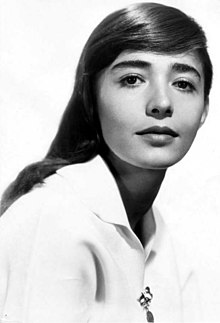This article includes a list of references, related reading, or external links, but its sources remain unclear because it lacks inline citations. (September 2011) |
You can help expand this article with text translated from the corresponding article in Spanish. (April 2021) Click [show] for important translation instructions.
|
Josefina Yolanda "Pina" Pellicer López de Llergo (3 April 1934 – 4 December 1964) was a Mexican actress known in her country for portraying the female lead in Macario (1960), and in the United States as Louisa alongside Marlon Brando in the Brando-directed movie One-Eyed Jacks (1961).
Pina Pellicer | |
|---|---|
 Pellicer in 1961 | |
| Born | Josefina Yolanda Pellicer López de Llergo 3 April 1934 Mexico City, Mexico |
| Died | 4 December 1964 (aged 30) Mexico City, Mexico |
| Resting place | Panteón Jardín Mexico City, Mexico |
| Years active | 1950–1964 |
| Relatives | Pilar Pellicer (sister) Ana Pellicer (sister) Carlos Pellicer (uncle) |
| Signature | |
 | |
Childhood and family edit
Josefina Yolanda Pellicer López de Llergo was born on 3 April 1934 in Mexico City, daughter of César Pellicer Sánchez, a lawyer, and Pilar López de Llergo.[citation needed] Her uncle Carlos Pellicer was a modernist poet. Of her seven siblings, her younger sister Pilar Pellicer also became an actress best known for her roles in numerous telenovelas; another younger sister, Ana, is a sculptor and the co-author of Pina Pellicer's 2006 biography.[citation needed]
Career edit
Pellicer's first acting role, albeit only her second movie to be released, was the Paramount Pictures production One-Eyed Jacks.[citation needed] In the movie, Pellicer played Louisa, the stepdaughter of Karl Malden and the lover of Marlon Brando. Mexican actress Katy Jurado also appeared as Louisa's mother. The production of the movie was much delayed, and the original director Stanley Kubrick left along with screenwriter Sam Peckinpah, leaving Brando to finish the movie – the only time Brando was credited with directing a movie. So even though production started in 1958, the movie was not released until 1961. European response was positive, and in July 1961 the movie received the Golden Shell (Concha de Oro) at the San Sebastián International Film Festival. In addition, Pellicer was awarded the prize for best female performer, with reviews comparing her to Audrey Hepburn. In the United States, the response was more mixed and the movie received only one Academy Award nomination, for Charles Lang's cinematography.[citation needed]
The first movie with Pellicer to reach the theaters was the Mexican production Macario, released in 1960.[citation needed] Pellicer played the wife of the title character opposite Ignacio López Tarso. Macario was the first Mexican production to be nominated for the Academy Award for Best Foreign Language Film, but ultimately lost out to Ingmar Bergman's The Virgin Spring. After Macario, Pellicer appeared in two more Mexican films, Días de Otoño, released in 1963, and Sinful, released after her death in 1965. During her appearance at the San Sebastián Film Festival, she met Spanish director Rafael Gil, who cast the actress for the title role in the movie Rogelia, filmed in Asturias and released in 1962. In addition to her movie work, she also appeared in episodes for the television shows The Fugitive ("Smoke Screen", 1963) and The Alfred Hitchcock Hour ("The Life Work of Juan Diaz", 1964; written by Ray Bradbury), as well as on Mexican television.[citation needed]
Death edit
Pellicer died by suicide on 4 December 1964, aged 30, with an overdose of sleeping pills.[1] Her body was buried at Panteón Francés in Mexico City.[2][3]
Filmography edit
| Year | Title | Role | Notes |
|---|---|---|---|
| 1960 | Macario | Macario's wife | |
| 1961 | One-Eyed Jacks | Louisa | Silver Shell for Best Actress |
| 1962 | Rogelia | Rogelia | |
| 1962 | Días de Otoño | Luisa | |
| 1963 | The Fugitive | María Álvarez | Episode: "Smoke Screen" |
| 1964 | The Alfred Hitchcock Hour | María Díaz | Episode: "The Life Work of Juan Díaz" |
| 1965 | Sinful | Irma | (final film role) |
References edit
Inline citations edit
- ^ "Mexican Actress a Suicide". The New York Times. Mexico City. 12 December 1964. p. 34. Retrieved 18 July 2018.
- ^ "La tragedia de Pina Pellicer: la estrella que se mató por soledad" [The tragedy of Pina Pellicer: the star who killed herself out of loneliness] (in Spanish). 18 March 2018. Retrieved 17 June 2022.
- ^ "Pina Pellicer: la fuerte depresión que la llevó a acabar con su vida" [Pina Pellicer: the strong depression who led to end her life] (in Spanish). 19 July 2019. Retrieved 17 June 2022.
General references edit
- Reynol Pérez Vázquez & Ana Pellicer: Pina Pellicer. Luz de tristeza (1934–1964); México, D.F.: Universidad Nacional Autónoma de México (2006). ISBN 970-32-3075-X
- Juan José Olivares: "Pina Pellicer, mujer adelantada a su época, pero invadida por la tristeza"; La Jornada, 24 April 2007.
- Reynol Pérez Vázquez: "Pina Pellicer: una vida frágil"; Pointcast Media "Los Tubos", 24 April 2007.
- Luis José de Ávila: "Pina, la musa de Marlon Brando"; La Voz de Asturias, 18 February 2006.